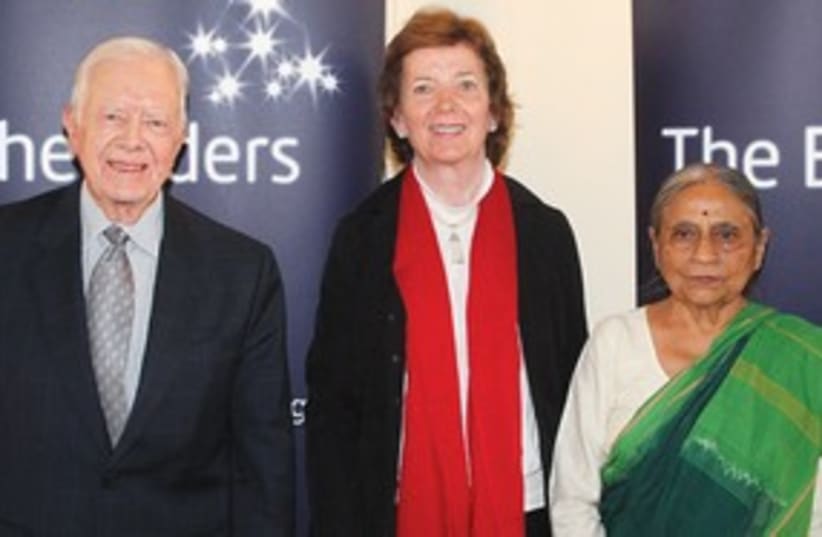RELATED:Jimmy Carter being sued for alleged falsehoodsIsraelis form North Korea friendship groupIn a brief story, without comment, the North's KCNA state news agency said the group had arrived by chartered plane.Carter's visit comes as momentum builds towards a resumption of aid-for-disarmament talks, which the North quit in 2009 but now wants to rejoin. The six-party talks involve the two Koreas, the United States, China, Japan and Russia."The outlook for the diplomatic engagement is the best it has been in two years, but the prospects for a satisfactory outcome have never looked worse," said Douglas Paal of the Carnegie Endowment for International Peace in Washington.Few people believe the secretive North will ever give up its pursuit of nuclear weapons, saying they serve as a deterrent against attack as well as being the ultimate bargaining chip."All sides are now preparing propaganda campaigns to portray their stances as more reasonable than those of the other countries involved," Paal wrote on the Carnegie website.Both Seoul and Washington are skeptical about the North's sincerity about denuclearising, and have demanded Pyongyang take concrete actions to show it is willing to ditch its nuclear weapons program.Experts say the North could do this by allowing international nuclear inspectors back into the country.South Korea's foreign minister played down the Elders' visit, but said he would meet the delegates in Seoul at the end of the week when they conclude their three-day visit to Pyongyang."Personally, I don't see why North Korea would send a message through a third party or civilians when various channels for dialogue are open," Foreign Minister Kim Sung-hwan told a news briefing.Nobel Peace prize winner Carter brokered in 1994 a deal that pulled Washington and Pyongyang back from the brink of war over the North's nuclear program. But he said he was not going in as anyone's envoy this week."The Elders are not in a position to negotiate, we're not mediators. We're going to learn what we can and share what we find with the leaders with whom we have contact in the future," he said in Beijing on Monday.Analysts say if the North's push for talks do not yield a response it could stage another belligerent act, such as conducting a nuclear or missile test, to try to force Seoul and Washington back to the negotiating table.Carter and his team, which includes former Irish President Mary Robinson, former Finnish President Martti Ahtisaari and ex-Norwegian Prime Minister Gro Brundtland, will also be looking at the isolated state's food shortages.More than 6 million people in North Korea urgently need food aid because of substantial falls in domestic production, food imports and international aid, the United Nations said last month.
Carter arrives in N. Korea on peace-building mission
Former US president and "Elders" delegation visit Pyongyang hoping to defuse tensions between Koreas, alleviate food shortages.

RELATED:Jimmy Carter being sued for alleged falsehoodsIsraelis form North Korea friendship groupIn a brief story, without comment, the North's KCNA state news agency said the group had arrived by chartered plane.Carter's visit comes as momentum builds towards a resumption of aid-for-disarmament talks, which the North quit in 2009 but now wants to rejoin. The six-party talks involve the two Koreas, the United States, China, Japan and Russia."The outlook for the diplomatic engagement is the best it has been in two years, but the prospects for a satisfactory outcome have never looked worse," said Douglas Paal of the Carnegie Endowment for International Peace in Washington.Few people believe the secretive North will ever give up its pursuit of nuclear weapons, saying they serve as a deterrent against attack as well as being the ultimate bargaining chip."All sides are now preparing propaganda campaigns to portray their stances as more reasonable than those of the other countries involved," Paal wrote on the Carnegie website.Both Seoul and Washington are skeptical about the North's sincerity about denuclearising, and have demanded Pyongyang take concrete actions to show it is willing to ditch its nuclear weapons program.Experts say the North could do this by allowing international nuclear inspectors back into the country.South Korea's foreign minister played down the Elders' visit, but said he would meet the delegates in Seoul at the end of the week when they conclude their three-day visit to Pyongyang."Personally, I don't see why North Korea would send a message through a third party or civilians when various channels for dialogue are open," Foreign Minister Kim Sung-hwan told a news briefing.Nobel Peace prize winner Carter brokered in 1994 a deal that pulled Washington and Pyongyang back from the brink of war over the North's nuclear program. But he said he was not going in as anyone's envoy this week."The Elders are not in a position to negotiate, we're not mediators. We're going to learn what we can and share what we find with the leaders with whom we have contact in the future," he said in Beijing on Monday.Analysts say if the North's push for talks do not yield a response it could stage another belligerent act, such as conducting a nuclear or missile test, to try to force Seoul and Washington back to the negotiating table.Carter and his team, which includes former Irish President Mary Robinson, former Finnish President Martti Ahtisaari and ex-Norwegian Prime Minister Gro Brundtland, will also be looking at the isolated state's food shortages.More than 6 million people in North Korea urgently need food aid because of substantial falls in domestic production, food imports and international aid, the United Nations said last month.